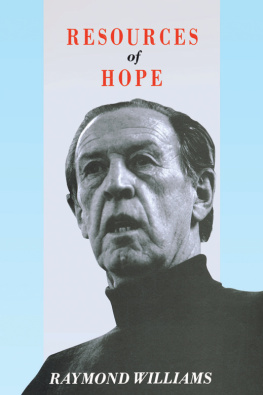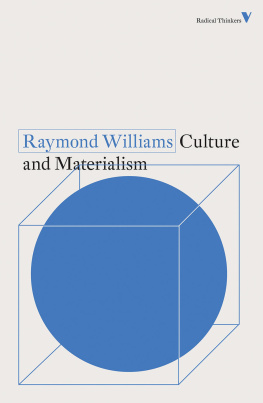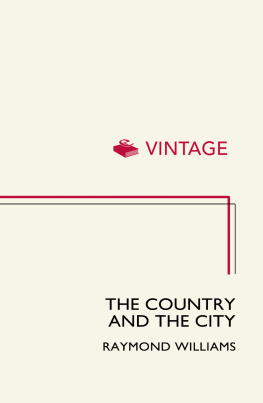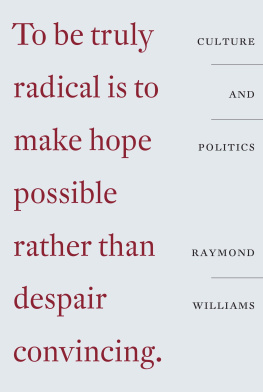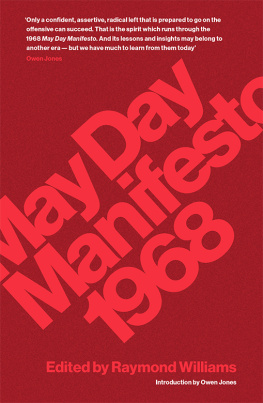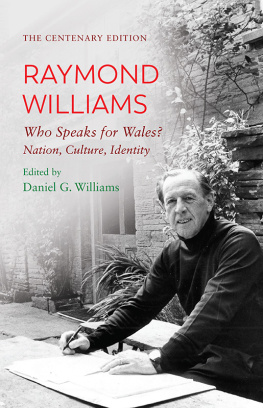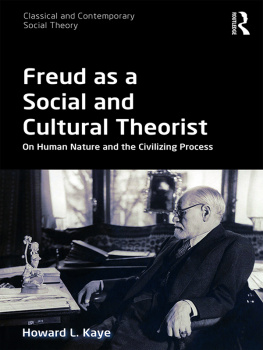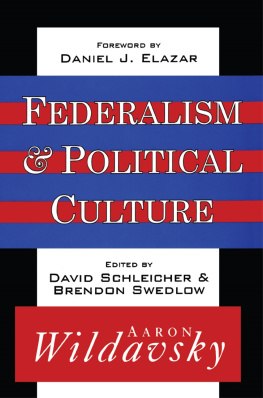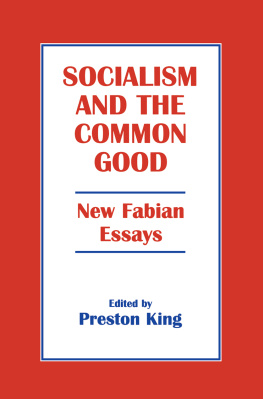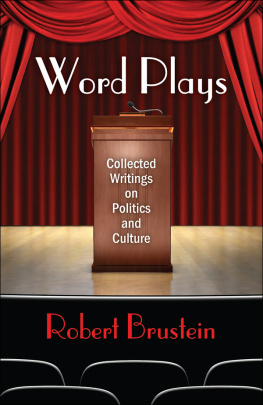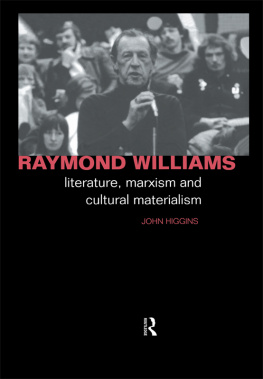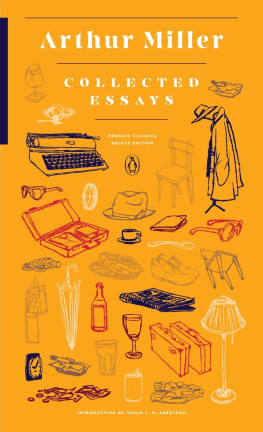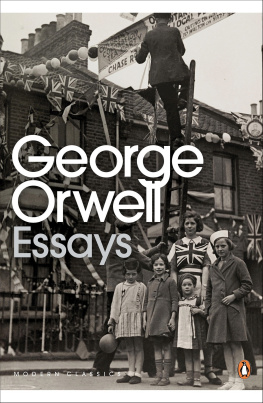1. Socialism. Theories, 1800-1985
I. Title
Williams, Raymond.
Resources of hope: culture, democracy, socialism/Raymond Williams.
p. cm.
Bibliography: p.
Includes index.
1. Political cultureGreat Britain. 2. SocialismGreat Britain. 3. Great BritainPolitics and government20th century. I. Title.
The essays collected in this volume were first delivered in lecture form or published as follows: Culture is Ordinary in Convictions, ed., Norman Mackenzie, MacGibbon and Gee 1958; Communications and Community is the text of the William F. Harvey Memorial Lecture, given at Bedford College, University of London on 8 April 1961; The Idea of a Common Culture (originally titled Culture and Revolution: A Comment) in From Culture to Revolution: The Slant Symposium 1967, eds, Terry Eagleton and Brian Wicker, Sheed and Ward 1968; The Arts Council in Political Quarterly 50, 1979; Why Do I Demonstrate? in The Listener 79, 25 April 1968; Youre a Marxist, Arent You? in The Concept of Socialism, ed., Bhiku Parekh, Croom Helm 1975; The Writer: Commitment and Alignment in Marxism Today, June 1980; Art: Freedom as Duty in Planet 68, April/May 1988, originally a contribution to the symposium, Art: Duties and Freedoms at Gregynog Hall, Newtown, Powys on 810 September 1978, and first published by the Department of Extramural Studies, The University College of Wales, Aberystwyth, in conjunction with The Welsh Arts Council 1979; Welsh Culture in Culture and Politics: Plaid Cymrus Challenge to Wales, Plaid Cymru 1975, originally a talk on BBC Radio 3, 27 September 1975; The Social Significance of 1926 in Llafur 2:2, 1977, originally an address to the commemorative conference, The General Strike and the Miners Lockout of 1926 organized jointly by Llafur and the National Union of Mineworkers at Pontypridd on 911 April 1976; The Importance of Community in Radical Wales 18, Summer 1988, originally a lecture given to the Plaid Cymru Summer School at Llandudno on 13 July 1977; Mining the Meaning: Key Words in the Miners Strike in New Socialist 25, March 1985; The British Left in NLR 30, March-April 1965, an amended version of an article written for the French journal Esprit 32, 1964; Ideas and the Labour Movement in New Socialist 2, November/December 1981; An Alternative Politics in The Socialist Register 1981, Merlin Press 1981; Problems of the Coming Period in NLR 140, July-August 1983, originally a talk given to the Socialist Society on 11 May 1983; Socialists and Coalitionists in The Future of the Left, ed., James Curran, Polity Press and New Socialist 1984, originally published as Splits, Pacts and Coalitions, New Socialist 16, March/April 1984; The Politics of Nuclear Disarmament in NLR 124, November-December 1980, and subsequently in Exterminism and Cold War, eds, E.P. Thompson et al., Verso 1982; Socialism and Ecology, in SERA pamphlet 1982, originally a talk given to the Socialist Environment and Resources Association; Between Country and City in Second Nature, eds, Richard Mabey et al., Jonathan Cape 1984; Decentralism and the Politics of Place in Society and Space vol. 2, 1984, an interview conducted by Philip Cooke of Plaid Cymru, first published in a slightly shorter form as Nationalisms and Popular Socialism in Radical Wales 2, Spring 1984; The Forward March of Labour Halted? in The Forward March of Labour Halted?, eds, Martin Jacques and Francis Mulhern, Verso 1981; Democracy and Parliament in Socialist Society pamphlet 1982, and subsequently in Marxism Today, June 1982; Walking Backwards into the Future in New Socialist 27, May 1985; Hesitations before Socialism in New Socialist 41, September 1986; Towards Many Socialisms in Socialism on the Threshold of the Twenty-first Century, ed., Milo Nikoli, originally a contribution to The Tenth Round Table International Conference Socialism in the World at Cavtat, Yugoslavia on 2126 October 1985; The Practice of Possibility, an interview conducted by Terry Eagleton, in the New Statesman, 7 August 1987.
****
The writings republished in this volume have received only a necessary minimum of editorial intervention. Obvious errors and omissions have been corrected; punctuation has been normalized only where required by sense; superfluous headings have been omitted or amended. As a collection of lectures, articles, essays and interviews spanning thirty years and originally addressed to specific audiences or readerships, there inevitably exists a degree of overlap and repetition in the volume. In particular a decision was made to publish all the available work on Labour strategy and socialist democracy rather than introduce arbitrary criteria for editing or exclusion. The title Resources of Hope takes up a phrase used on a number of occasions by Raymond Williams; most significantly in the final chapter of Towards 2000, Resources for a Journey of Hope. We thank Joy Williams for her help and advice in preparing this volume.
Robin Gable
October 1988
Raymond Williams, who died on 26 January 1988, was the most authoritative, consistent and original socialist thinker in the English-speaking world. The loss to the British Left of a spokesman at the height of his powers remains deeply felt. Tributes to Williams appeared in many newspapers and periodicals, testifying to a widespread sense that the established culture had lost its most acute critic. Williams approached literature, cultural studies, communications and adult education in such radically new ways that he revolutionized their study and practice. While this cultural work was linked to his conception of a democratic long revolution, its validity and importance were nevertheless recognized by many who had no prior commitment to his anti-capitalist politics. Similarly Williamss drama and novels explore profoundly political themes but, like all his writing, are couched in a language far removed from received political discourse. Part of the value of Williamss work to the Left is that it does not belong to the Left alone.
Yet for a full understanding of Williamss work it is essential to attend to its political meanings. An understanding of, and commitment to, a radically transformed social order were integral to his vision and achievement. Williamss directly political interventions were a natural outgrowth of his concern for a democratic culture, just as the experience and commitments they reflect themselves helped to inform his major critical studies. The writings and lectures brought together in this book share a political theme even when they do not directly engage with politics as such they can all be seen as expressing and developing his conception of that long revolution whereby full equality and citizenship could be extended to the whole population.

